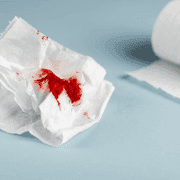Don't Ignore Bummy Pain: Could It Be Piles?
In This Article
Don't Ignore Bummy Pain: Could It Be Piles?
Yashas
Updated on October 10, 2024
Medically verified by Dr. Arya
Fact checked by Dr. Pournami

Proctology
5 min read
Are you experiencing discomfort in your lower regions that you cannot seem to shake off? Ignoring bummy pain might not be the best approach.
It could be a sign of a common but often overlooked condition: piles, also known as hemorrhoids.
Mykare Health is here to enlighten you on this. In this blog, we'll delve into what piles are, their symptoms, causes, and most importantly, how to manage them effectively.
Don't let embarrassment or uncertainty keep you from seeking relief. Let's uncover the facts together.
Understanding Piles
Medically referred to as hemorrhoids, piles are a prevalent condition that affects millions of people worldwide. Even though this ailment is common, people frequently ignore or minimize its symptoms, which include rectal bleeding, discomfort, or swelling. Ignoring these indicators may make the issue worse and result in further issues.
As such, it is imperative that you identify the symptoms and seek the necessary medical assistance as soon as possible. This article sheds light on piles, a problem that shouldn't be disregarded, by exploring its causes, symptoms, diagnosis, and available treatments.
Piles: Causes and Types
-
Piles are a painful and occasionally bleeding condition that arises from dilated or inflamed blood vessels in the anal area during bowel movements.
-
Their development is influenced by a number of variables, such as pregnancy, obesity, persistent constipation or diarrhea, and straining during bowel movements.
-
The two primary categories of piles are exterior and interior.
-
Whereas external piles grow beneath the skin around the anus, internal piles occur inside the rectum.
-
Comprehending the fundamental reasons and varieties of piles is imperative for efficient handling and therapy.
Recognising Symptoms: When to Seek Help
-
Understanding piles symptoms is essential for prompt management and intervention.
-
Rectal hemorrhage, irritation or itching around the anus, pain or discomfort during bowel movements, and a lump or swelling near the anus are common symptoms.
-
Even though the intensity of these symptoms could differ, they should never be disregarded, particularly if they continue or get worse with time.
-
To receive an accurate diagnosis and a treatment plan that is customised to each patient's circumstances, speaking with a healthcare professional is essential. Prompt identification can avert issues and enhance the standard of living.
Diagnosis and Evaluation: What to Expect
A medical professional will usually perform a complete physical examination and study of the patient's medical history in order to diagnose piles. The doctor may ask about symptoms, lifestyle choices, and past medical history while doing the examination.
A digital rectal examination, sigmoidoscopy, or colonoscopy may be suggested in some situations in order to determine the severity of the problem and rule out other possible explanations of the symptoms.
These diagnostic techniques assist medical practitioners in making a precise diagnosis and creating a treatment plan that is suitable for the patient's requirements.
 7 min read
7 min readBlood In The Stool: A Sign You Shouldn’t Ignore
 6 min read
6 min readSitting All Day Wreaking Havoc? It Might Be Piles!
 5 min read
5 min readPregnancy & Piles: Taming This Discomfort
Get a Callback Now
Knowing the Causes and the Risks
Pile formation is caused by a number of reasons, including elevated pressure on the blood vessels in the rectal region. Hemorrhoids can form as a result of straining during bowel movements, obesity, lengthy periods of sitting or standing, and chronic constipation or diarrhea.
Pregnancy, aging, and genetics all have important effects. Finding these risk factors makes it easier to seek early intervention and implement preventive actions.
Obtaining Medical Assessment: Significance and Procedure
Even if it may be difficult, seeing a medical practitioner right once is essential for a precise diagnosis and treatment strategy. In order to determine the severity of the condition, doctors usually perform a physical examination of the anal region and may suggest further testing such as a digital rectal examination or anoscopy.
An early diagnosis makes it easier to implement the right management techniques to reduce symptoms.
Treatment Options: From Conservative to Surgical
Depending on the severity of symptoms and the specific situation, there are many approaches to treating piles.
For mild cases, home remedies and lifestyle changes could be enough to reduce piles symptoms and encourage healing.
Changing one's diet, consuming more fiber, practicing good hygiene, and using over-the-counter drugs like suppositories or topical lotions are a few examples.
Infrared coagulation, sclerotherapy, rubber band ligation, and other minimally invasive treatments may be necessary for more serious or persistent instances.
Rarely, surgical alternatives such a hemorrhoidectomy might be taken into account. A healthcare expert should be consulted before choosing a course of treatment.
Prevention Strategies: Tips for Avoiding Recurrence
Even while piles can reoccur, some lifestyle changes and preventative steps can help lower the chance of recurrence and successfully manage symptoms.
Essential preventive measures include eating a high-fiber diet, drinking plenty of water, avoiding extended sitting or straining during bowel movements, and maintaining proper hygiene.
Frequent exercise can help lessen the pressure on the anal veins and enhance bowel function.
You can reduce their risk of piles and improve your overall digestive health by adopting these routines into their daily lives.
Don't Ignore the Signs
Even while piles can reoccur, some lifestyle changes and preventative steps can help lower the chance of recurrence and successfully manage symptoms.
Essential preventive measures include eating a high-fiber diet, drinking plenty of water, avoiding extended sitting or straining during bowel movements, and maintaining proper hygiene.
Frequent exercise can help lessen the pressure on the anal veins and enhance bowel function. People can reduce their risk of piles and improve their overall digestive health by adopting these routines into their daily lives.
Piles, or hemorrhoids, are swollen veins in the rectum and anus.
Symptoms include pain, itching, bleeding during bowel movements, and swelling around the anus.
Causes include straining during bowel movements, constipation, pregnancy, obesity, or prolonged sitting.
Treatment options range from lifestyle changes and OTC medications to medical procedures like rubber band ligation or surgery.
Prevention involves a high-fiber diet, hydration, regular exercise, and avoiding prolonged sitting or straining.
Consult a healthcare professional for persistent or severe symptoms.
Complications such as blood clots or prolapse may require medical attention.



